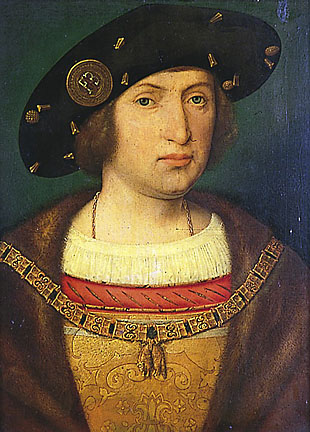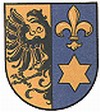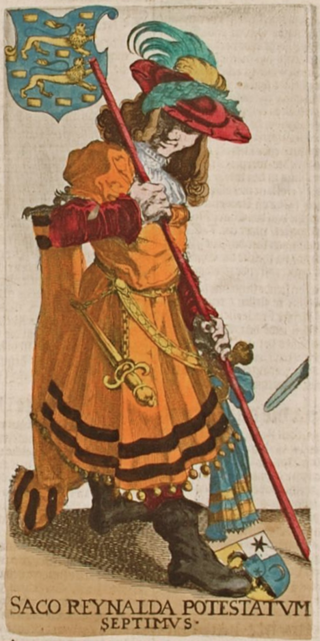
Podestà was the name given to the holder of the highest civil office in the government of the cities of Central and Northern Italy during the Late Middle Ages. Sometimes, it meant the chief magistrate of a city state, the counterpart to similar positions in other cities that went by other names, e.g. rettori ("rectors").

Goutum is a village in the municipality Leeuwarden in the province of Friesland, the Netherlands. It had a population of around 2,945 in January 2017. It is still an independent village, but is surrounded by the city of Leeuwarden on all sides.

Juw Dekema was a Frisian chieftain and Schieringer in Weidum and Baard, who was elected as potestate of Friesland in 1494 at the diet of Sneek. In 1498 he asked Albrecht of Saxony to rule the land. Juw served as a councilor at the Court of Friesland (1500–1515) and magistrate of Baarderadeel (1510–1512).

Floris van Egmond was count of Buren and Leerdam and Lord of IJsselstein and Sint Maartensdijk. He was stadtholder of Guelders (1507–1511) and Friesland (1515–1518)
Sikke Sjaardema, alternatively spelled Sikko or Sicka, was the eighth potestaat of Friesland, a province of the Netherlands. The potestaat was the elected provincial ruler.

Gale Hania was the thirteenth potestaat of Friesland, a province of Netherlands.
Sytse Dekama was the twelfth potestaat of Friesland, which was in the time of the religious disputes between Schieringers and Vetkopers. There is little known about Sytse Dekama only historian Occo Scarlensis mentions Dekama. He succeeded Juw Juwinga when he died in 1396.
Adelbrik Adelen was the third potestaat of Friesland a province of the Netherlands.
Hessel Martena was the tenth Potestaat of Frisia. He succeeded Reinier Camminga.
Reinier Camminga was the ninth potestaat or governor of Friesland now a province of the Netherlands.

Igo Galama was the legendary fifth potestaat of Friesland, now a province of the Netherlands. There is no evidence that he existed.
Sjoerd Pijbes Wiarda was the fifteenth potestaat of Friesland now a province of the Netherlands.
Gosse Ludigman was a legendary potestaat of Friesland, now a province of the Netherlands. He does not appear in sources until hundreds of years after his supposed life.

Saco Reinalda was a legendary potestaat of Friesland, now a province of the Netherlands. Sometimes his name was written as Rengnalda, his son was called Wilco Reinalda.

Liudolf of Brunswick was Margrave of Frisia, Count of Brunswick, Count in the Derlingau and the Gudingau.
Hessel Hermana is the fourth potestaat of Friesland in the list of rulers of Frisia. Supposedly from Sexbierum, he does not appear in historical sources until the late 16th century.

Georg Schenck van Toutenburg was Stadhouder of Friesland (1521-1540). Later he was also Stadholder of Overijssel, Drenthe and Groningen. His son Frederick was the first archbishop of Utrecht.
Taco is a given name and a nickname. Notable people with the name include:

Taco Scheltema, or Take Pieters Scheltema was a Dutch portrait painter.
Potestaat was the title of a governor of medieval Friesland. According to the legendary 8th-century Karelsprivilege, which is probably a later forgery, Charlemagne had first granted the title of potestaat to Magnus Forteman. He and most of his early successors were probably entirely fictional, invented later by pseudohistorians in order to argue in favour of the notion of Frisian freedom. The title potestaat does not appear in historical documents until 1470, and at most, the earliest potestaatavant la lettre can be dated to the 13th century.








